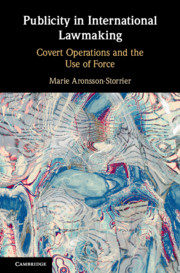Book contents
- Publicity in International LawMaking
- Publicity in International LawMaking
- Copyright page
- Contents
- Acknowledgements
- 1 Introduction
- 2 The Use of Force and the Scope for Dynamic Development
- 3 Customary International Law and the Requirement of Publicity
- 4 Quasi-Covert Operations and the Identification of Claims
- 5 Unacknowledged Operations
- 6 Concluding Remarks
- Index
4 - Quasi-Covert Operations and the Identification of Claims
Published online by Cambridge University Press: 21 January 2021
- Publicity in International LawMaking
- Publicity in International LawMaking
- Copyright page
- Contents
- Acknowledgements
- 1 Introduction
- 2 The Use of Force and the Scope for Dynamic Development
- 3 Customary International Law and the Requirement of Publicity
- 4 Quasi-Covert Operations and the Identification of Claims
- 5 Unacknowledged Operations
- 6 Concluding Remarks
- Index
Summary
This chapter examines quasi-covert conduct, that is, acts that are acknowledged and justified in part; hypothetical justifications not related to an acknowledgement of actual conduct; and acts that are acknowledged or justified after some time. Focusing primarily on the United States’ drone strikes in Pakistan under the Obama administration, it is demonstrated how quasi-covert operations pose significant challenges to the development of international law by creating uncertainty as to the way in which specific conduct may alter international law, and as to when states need to react in order to avoid their silence being interpreted as acquiescence.
- Type
- Chapter
- Information
- Publicity in International LawmakingCovert Operations and the Use of Force, pp. 88 - 129Publisher: Cambridge University PressPrint publication year: 2020

